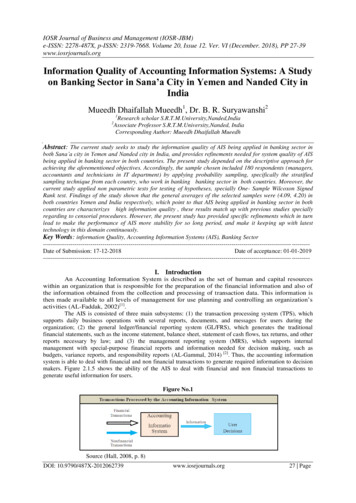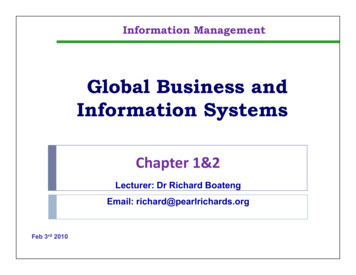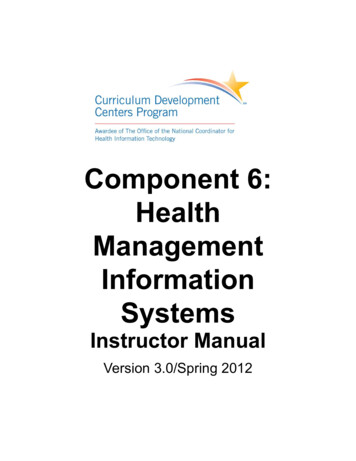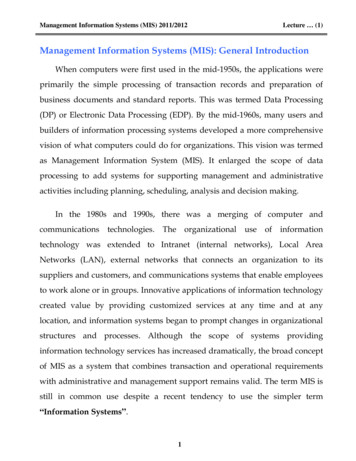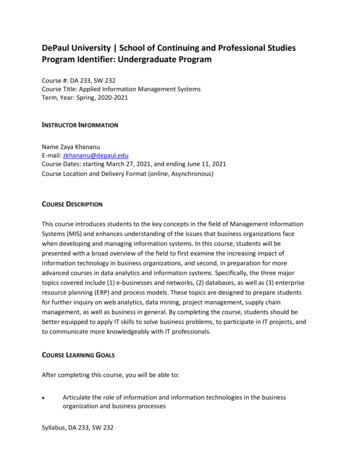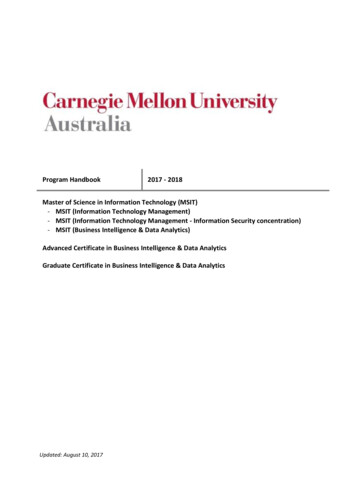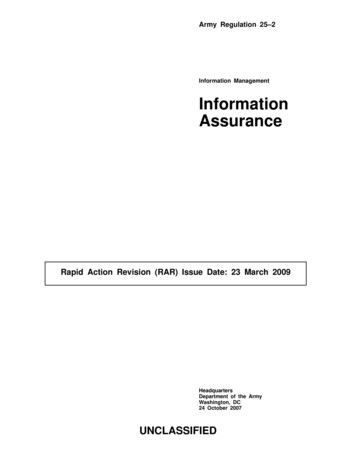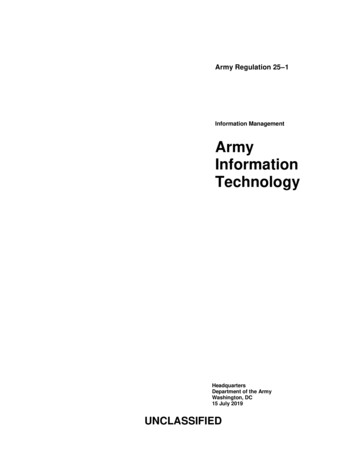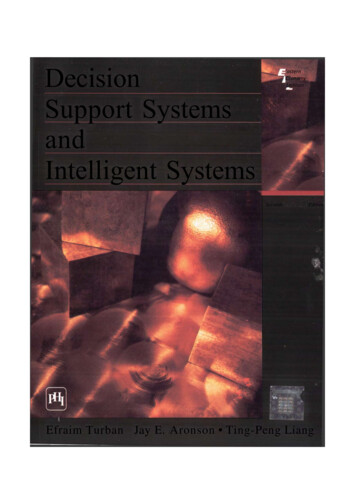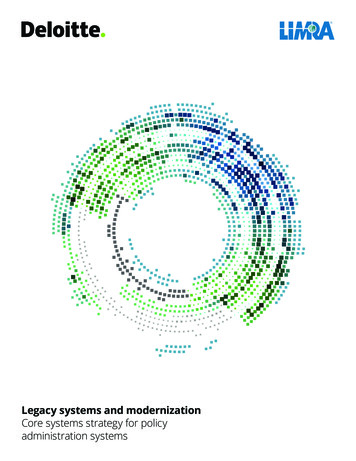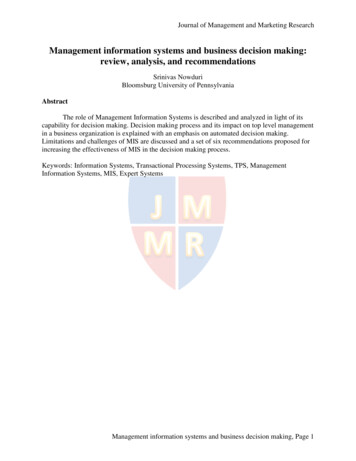
Transcription
Journal of Management and Marketing ResearchManagement information systems and business decision making:review, analysis, and recommendationsSrinivas NowduriBloomsburg University of PennsylvaniaAbstractThe role of Management Information Systems is described and analyzed in light of itscapability for decision making. Decision making process and its impact on top level managementin a business organization is explained with an emphasis on automated decision making.Limitations and challenges of MIS are discussed and a set of six recommendations proposed forincreasing the effectiveness of MIS in the decision making process.Keywords: Information Systems, Transactional Processing Systems, TPS, ManagementInformation Systems, MIS, Expert SystemsManagement information systems and business decision making, Page 1
Journal of Management and Marketing Research1. IntroductionInformation Systems can be conceptualized in terms of three types of systems:Transactional Processing Systems (TPS), Management Information Systems (MIS), and ExpertSystems. MIS has several subsets such as Decision Support Systems and Executive InformationSystems. The role of MIS in decision support is best discussed in the context of the subsetreferred to as Decision Support System (DSS). A DSS is a computer based system (anapplication program) capable of analyzing an organizational (or business) data and then presentsit in a way that helps the user to make business decisions more efficiently and effectively. It isbasically an informational application which depends on the information already input whileanswering to a given query. For example, a decision support system could provide: Comparative sales figures for one week/month and the next Projected revenue figures based on new product sales assumptions Consequences of different decision alternatives, given past experienceSometimes there is an overlap between the broad categories of IS and a DSS could becapable of presenting information graphically through an expert system or artificial intelligence(AI). Usually the DSS is used by all levels of people within a business organization. Top levelmanagement uses DSS for strategic decisions, middle management uses for tactical decisionwhile first line supervisors use deploy it for day-to-day operational decisions.Therefore, the process of decision-making in any business is an inherently vital aspect not justfor organizations but also for individuals who greatly rely on these decisions for their survival inthe highly competitive arena of entrepreneurship (Al-Zhrani, 2010, p.1249-1251). Moreimportantly, Management Information System (commonly abbreviated as MIS) has been anincreasingly used tool in the institutionalization and making of decisions. DSS are a subset ofMIS, for intelligent decision making. However, dispite the immense benefits that result fromusing MIS in decision making, some critics have, reportedly, been slowly—but surely—assertingthat MIS poses surmountable detrimental effects to organizations and should thus be usedsparingly or avoided if possible (Demetrius, 1996).According to Kumar (2006), in order to define MIS, it must be principally divided intothe three facets that constitute it—which are: management, information, and systems. Infurthering his ideas, Kumar simply defines management as the process through which managersplan, organize, initiate and control operations within their businesses. Essentially, a managementcan only exist when there are subjects/ workers to be managed (Al-Zhrani, 2010, p.1248-1252;The Maniac, n.d.).Kumar also states that information generally refers to analyzed data. In other words,information (with regards to business) results from data that is analyzed using business statutes,principles and theories advanced by various macroeconomists.Finally, system, according to Kumar, refers to “A set of elements joined together for acommon objective.” More often than not, business systems normally consist of smallersystems—known as subsystems—which all function towards ensuring efficacy of the largesystems. As a matter of fact, systems vary from one organization to another depending on thenature of organizational operations, size of the businesses and organizational priorities amongmany other salient factors.Based on the foregoing definitions, Management Information Systems refers to a systemthat uses information in order to ensure apt management of businesses. Fundamentally, all thefacets of MIS run concomitantly in order to ensure overall efficiency of the whole system.Management information systems and business decision making, Page 2
Journal of Management and Marketing ResearchFailure in one part means overall failure for the other parts since they are all designed to functioninterdependently (Davenport & Short, 1990).Consequentially, a good management of information systems leads to good decisionmaking in business just in the same way poor management leads to poor decision making. It isbased on this foundational concept that this paper is going to circumspectly analyze the roles ofmanagement systems in decision making.Notably, this study will be arranged as follows. The study will begin by giving a briefoverview into the decision making process in businesses while establishing the point in which itlinks with MIS. From here, an expansive analysis and review will be done on the roles of MIS inimproving decision making. This will then be followed by a mentioning of the questionable areasassociated with MIS and decision making. After that, recommendations will be given to solve theunderlying issues that result from the paper. Finally, a conclusion will be given to summarize thecontents of the paper.2. Main Discussion—Role of MIS in Improving decision makingPreliminarily, it is inherent to state that decision making is an integral part of anybusiness (The maniac, n.d.). This is because a majority of operations in an organization revolvearound decisions made by the management and other key stakeholders in the organization. Andin order for decision to be made adequately, it is vital for there to be a good information systemsince decisions are based on information available.In relations to this, Jahangir (2005) states that based on the significant role thatinformation plays in choice of decision to be made, organizations must ensure that they have agood management information system. As a notable general observation, a good MIS ensuresgood decision making just in the same way bad MIS propel the making of bad decisions.UStudy.in (2010) supports the above observation by saying that “The quality ofmanagerial decision-making depends directly on the quality of available information” and themanagers should therefore cultivate an environment that encourages the growth and viablesprouting of quality information.Essentially, before deciding on which MIS strategy to use, it is vital to ensure that thechoice made is fully compatible with your current system. This will not only help in avoidingerratic choices but it will also save you the time and money that would have been otherwisewasted by that person (Rhodes, 2010; Jahangir, 2005). In addition to that, it is noteworthy for theMIS strategy or tool used to be in line with the decisions that are to be made. In other words,there should be a connecting point between the decision to be made and the MIS to be used byindividual or corporate business owners (Jarboe, 2005).As a key consideration, Management Information Systems is a highly complex anddelicate arena that calls for a lot of caution to be taken by its managers. It is for this reason that itis recommendable for organizations to ensure that they carefully select the individuals who areplaced to control the systems. The more cautious and professional a person is, the better theperson gets an assurance of positive prospects of in MIS with regards to decision making andother related areas of business (Lingham, 2006).Having clearly delineated that, what then are some of the scholarly arguments, facts,opinions and observations made by various macroeconomists with regards to the roles ofManagement Information System in improving decision making?Management information systems and business decision making, Page 3
Journal of Management and Marketing ResearchTo begin with, MIS provides a fitting platform for good decision making (Kumar, 2006).Essentially, without the established systems of getting information in MIS, it would be extremelydifficult for organizations to make their decisions. This is because they would be forced tomaking baseless information due to the lack of confirmed information. Moreover, MIS normallylays a firm foundation for the establishment of concrete decisions through its systematic tools,timely information and adequate managerial policies and regulations.Furthermore, Management information Systems’ statutes regarding businesses act asguidelines to business owners when making critical decisions about their businesses. As a result,managers and key decision makers are bridled from overstepping their boundaries or exceedingtheir business mandate. This is very crucial as it helps in keeping businesses checked andbalanced thus ensuring that only proven decisions are considered while the untried ones arethwarted. More importantly, the capacity to guide decision-making facilitates progress andimprovement of the operations in a company (Lingham, 2006; Chambers, 1964, p.15-20).In addition, most MIS programs are endowed with the capacity to give real-time updatesof the occurrences in company or system. By real-time, scholars simply refer to immediateupdates of occurrences in a system. These immediate updates help mangers to take necessaryactions as soon as is deemed appropriate—especially during the discovery and management ofcrises. This augments progress and improvement in company operations through timely decisionmaking. This is important for companies in the modern-day generation where any slight lapse indecision making can lead to very huge losses (Allen, et al., 2010)Still, Management information systems are very elemental improving company securities(Davenport & Short, 1990). For example, in many instances, most management informationsystems can be easily programmed by the owner to conduct certain actions at certain times. Ineffect, managers can program the system to perform certain routine checks which can help inimproving efficiency of a company through easy discovery of bugs or problems. Furthermore,the programmability of most MIS saves a lot of priceless time and resources for owners. In otherwords, through programmability, business managers can program the systems to automaticallydiscover certain deficiencies and even solve them.Consequently, the manager or system operator can use the time and resources he/shewould have used in monitoring or fixing problems for other key uses. By routinely programminga Management Information System, the business is bound to make positive progress since timeand resources can be easily channeled into rightful business paths (Allen, et al., 2010)As a fundamental point, a good number of MIS used today can perform multiple tasks allat the same time. This potential to multitask increases efficiency in a company since severalbusiness operations can be conducted simultaneously. With special regards to decision making,the capacity to multitask ensures that decisions are made speedily when compared to thosesystems which can only handle one task at a time.Closely related to the above point, Jahangir (2005) says that some MIS allow multipleusers to access the same content all at the same time without any discrepancies. This potentialityboosts accountability from the business operators since multiple people can access a particularcontent and verify whether they are consistent or whether they are not. As a matter of fact, mostorganizations tend to suffer due to poor accountability from those charged with the mandate tomanage certain details. This safeguard action of some MIS is what macroeconomists refer to asthe “gate-keeping” role of MIS in decision making and overall well-being of the organization.On another level, a good number of MIS play the role of record keeping orinstitutionalization of data bases that can easily keep confidential or invaluable information. InManagement information systems and business decision making, Page 4
Journal of Management and Marketing Researchessence, decision making often calls for the reading of certain past work (Jahangir, 2005). This iswhere record-keeping comes in handy. On the flipside, databases normally function towardsproviding future places of information retrieval. Principally, the record keeping and data-basingtool of MIS definitely ensures that decisions are made viably while businesses run smoothly.In contributing to the arguments regarding role of MIS in improving decision making,Rhodes (2010) also adds that:Management information systems give managers quick access to information. This caninclude interaction with other decision support systems, information inquiries, crossreferencing of external information and potential data mining techniques. These systemscan also compare strategic goals with practical decisions, giving managers a sense of howtheir decisions fit organizational strategy.In summary, Rhodes simply believes that management information systems are a hugecontributing factor in the getting of viable information from organizations. Sadly, very feworganizations have been able to ardently take up on this role and even lead other organization inthe society in doing the same. It is for this reason that there has been a limited improvement indecision making based on the tailoring of viable information. A candid way of solving thischallenge is given later in this paper under recommendations.Over the recent years, there has also been an increased usage of automated ManagementInformation Systems. To a large extent, these automated systems hav
02.10.2010 · MIS strategy or tool used to be in line with the decisions that are to be made. In other words, there should be a connecting point between the decision to be made and the MIS to be used by individual or corporate business owners (Jarboe, 2005). As a key consideration, Management Information Systems is a highly complex and delicate arena that calls for a lot of caution to be taken by its .
